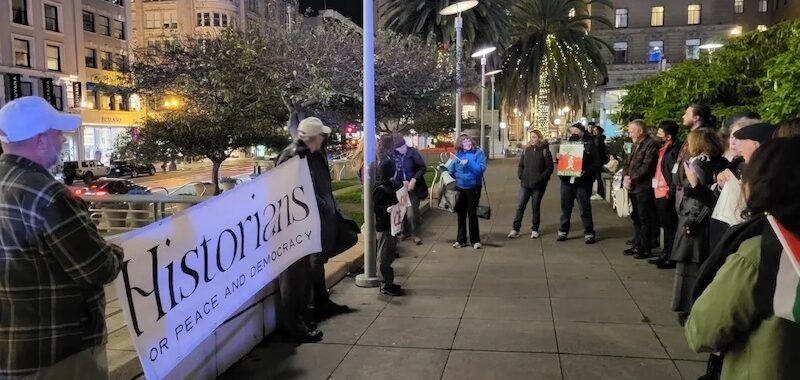The first week of 2025(!) brings—what else—more outrage. But today we look to a few good profs. This Sunday, following “a boisterous, hourlong, standing-room-only meeting,” the American Historical Association moved to condemn the ongoing scholasticide in Gaza.
Founded in 1884 by an act of Congress, the AHA is one of the oldest educational institutions in the United States. Its more than 10,000 members include historians at higher-learning institutions all around the country.
Historically (ha), the AHA has functioned as a moderate-to-conservative organization, often loath to weigh in on political matters. (They did not, for instance, take a position on the Vietnam War.) But thanks in part to pressure from groups like Historians for Peace and Democracy, the storied society has started to expand their mandate.
As Barbara Weinstein, a history professor at NYU, former AHA president, and movement leader told Democracy Now this morning, “we can’t have a narrow definition of what our roles are as historians.” She hopes this move from one of the country’s largest academic associations could be a bellwether, indicating that the “gatekeepers of history” are finally ready to think about their roles “more capaciously.”
The resolution—which passed with 428 members in favor, 88 opposed—condemns Israel’s “intentional effort to comprehensively destroy the Palestinian education system.” It also calls for a permanent ceasefire, and for the creation of a committee to help rebuild Gaza’s “educational infrastructure.”
Written and championed by members of Historians for Peace and Democracy, a group started in 2003 to oppose the Iraq War, the measure echoes concerns expressed by academics all over the world. UN experts first observed the beginnings of a scholasticide as early as April 2024, by which time 261 teachers, 95 university professors, and countless Palestinian students had been killed. Now those numbers are much higher.
Sherene Seikaly, another movement leader, University of California professor, and editor of the Journal of Palestine Studies, also expressed relief at the resolution’s “landslide” passage. Though she noted the measure’s language was “principled but not that radical.” Nonetheless, she hopes this day represents a turning point for the field and the country.
“This moment makes me feel like despite the fact that ever single day tor the last fifteen months I have watched the obliteration of my people—the future is still ours,” Seikaly told reporters.
The measure will now be examined by the AHA’s elected council. They can approve the resolution, veto it, or put it to the entire membership for a general vote.
You can read the full text of the resolution here.
Image via Historians for Peace

